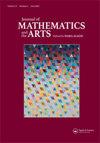棒状、螺旋状和多面体
IF 0.2
Q4 MATHEMATICS, INTERDISCIPLINARY APPLICATIONS
引用次数: 0
摘要
螺旋可以在许多时期的艺术和建筑中找到,但几乎总是作为单一的元素。它们可以组合成无限的结构,为雕塑提供了一系列很少被探索的可能性。螺旋在三维空间中最对称的排列可以由已知的排列棒的方法推导出来。其中一些可能性提出了新的形式,有螺旋穿过多面体的顶点,而且,由于对称性,除了螺旋穿过四个点的标准结构之外,还有一种可能性。其中一种无限结构是新描述的对构鞍多面体的基础,该多面体可以用其镜像填充空间。图形抽象本文章由计算机程序翻译,如有差异,请以英文原文为准。
Rods, helices and polyhedra
Helices can be found in the art and architecture of many periods, but almost always as single elements. They can be combined to make infinite structures that provide a range of possibilities for sculpture that have been little explored. The most symmetrical arrangements of helices in three dimensions can be derived from the known ways of packing rods. Some of these possibilities suggest new forms that have helices that pass through the vertices of polyhedra, and, because of the symmetry, there can be a possibility other than the standard construction of a helix through four points. One of the infinite structures is the basis for a newly described enantiomorphic saddle polyhedron that can fill space with its mirror image. GRAPHICAL ABSTRACT
求助全文
通过发布文献求助,成功后即可免费获取论文全文。
去求助
来源期刊

Journal of Mathematics and the Arts
MATHEMATICS, INTERDISCIPLINARY APPLICATIONS-
CiteScore
0.50
自引率
0.00%
发文量
19
 求助内容:
求助内容: 应助结果提醒方式:
应助结果提醒方式:


